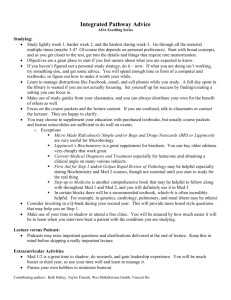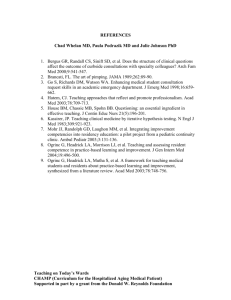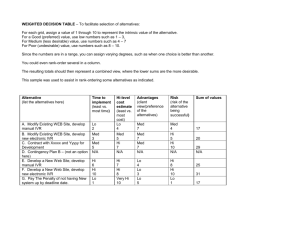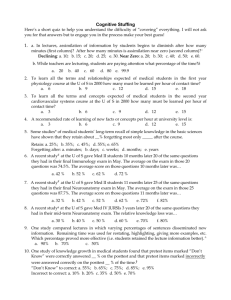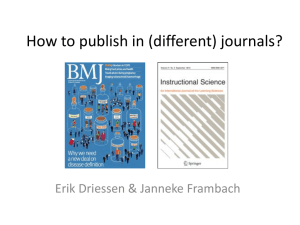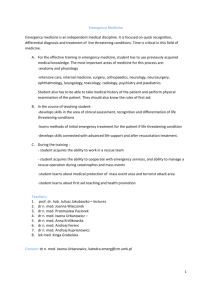Master of Public Health (MPH) – SC 542
advertisement
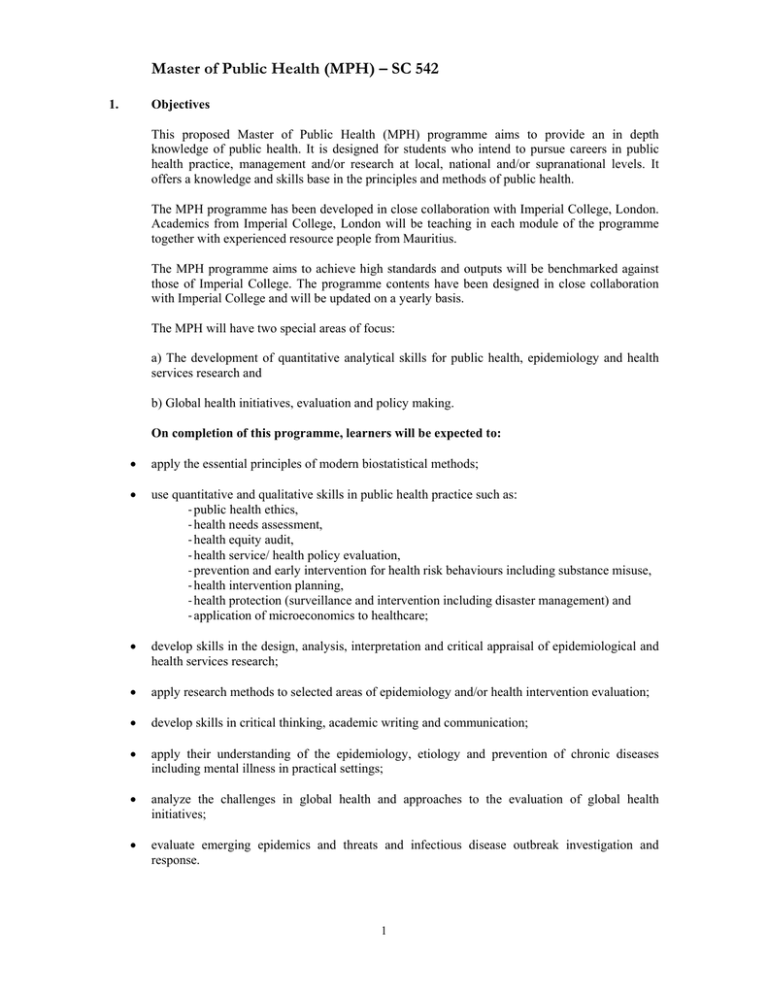
Master of Public Health (MPH) – SC 542 1. Objectives This proposed Master of Public Health (MPH) programme aims to provide an in depth knowledge of public health. It is designed for students who intend to pursue careers in public health practice, management and/or research at local, national and/or supranational levels. It offers a knowledge and skills base in the principles and methods of public health. The MPH programme has been developed in close collaboration with Imperial College, London. Academics from Imperial College, London will be teaching in each module of the programme together with experienced resource people from Mauritius. The MPH programme aims to achieve high standards and outputs will be benchmarked against those of Imperial College. The programme contents have been designed in close collaboration with Imperial College and will be updated on a yearly basis. The MPH will have two special areas of focus: a) The development of quantitative analytical skills for public health, epidemiology and health services research and b) Global health initiatives, evaluation and policy making. On completion of this programme, learners will be expected to: • apply the essential principles of modern biostatistical methods; • use quantitative and qualitative skills in public health practice such as: ‐ public health ethics, ‐ health needs assessment, ‐ health equity audit, ‐ health service/ health policy evaluation, ‐ prevention and early intervention for health risk behaviours including substance misuse, ‐ health intervention planning, ‐ health protection (surveillance and intervention including disaster management) and ‐ application of microeconomics to healthcare; • develop skills in the design, analysis, interpretation and critical appraisal of epidemiological and health services research; • apply research methods to selected areas of epidemiology and/or health intervention evaluation; • develop skills in critical thinking, academic writing and communication; • apply their understanding of the epidemiology, etiology and prevention of chronic diseases including mental illness in practical settings; • analyze the challenges in global health and approaches to the evaluation of global health initiatives; • evaluate emerging epidemics and threats and infectious disease outbreak investigation and response. 1 2. General Entry Requirements Successful completion of an undergraduate degree with • • at least a Second Class or 50%, whichever is applicable or a GPA not less than 2.5 out of 4 or equivalent, from a recognized higher education institution. OR alternative qualifications acceptable to the University of Mauritius. 3. Programme Requirements Medically Qualified Applicants MBBS, MBChB or equivalent; Non-Medically Qualified Applicants An Upper Second Class degree or equivalent or a BDS degree and Two years of experience in public health, health promotion, health administration, occupational and environmental health experience, clinical research or other health related fields. OR alternative qualifications acceptable to the University of Mauritius. Suitable candidates should have a strong academic record with adequate quantitative skills and a background in medicine, health sciences, biological sciences or environmental sciences. 4. General and Programme Requirements-Special Cases The following may be deemed to have satisfied the General and Programme requirements for admission: 5. (i) Applicants who do not satisfy any of the requirements as per Regulations 2 and 3 above but submit satisfactory evidence of having passed examinations which are deemed by the Senate to be equivalent to any of those listed. (ii) Applicants who do not satisfy any of the requirements as per Regulations 2 and 3 above but who in the opinion of Senate, submit satisfactory evidence of the capacity and attainments requisite to enable them to pursue the programme proposed. Programme Duration The programme is offered on a full time basis. The duration of the postgraduate programme should normally not exceed 2 years (4 semesters). The student may exit with a postgraduate diploma if he has not completed the research project. Master’s Degree (FT): Postgraduate Diploma (FT): 6. Normal 2 semesters 2 semesters Credits per Year Minimum 18 credits subject to Regulation 5. 2 Maximum 4 semesters 4 semesters 7. Minimum Credits Required for the Award of Master’s Degree: 36 Postgraduate Diploma: 24 Breakdown as follows: Master’s Degree: Postgraduate Diploma: 8. Core Taught Modules 24 credits 24 credits Project 12 credits Assessment Each module will carry 100 marks (3 credits) and will be assessed as follows (unless otherwise specified): Each module will be assessed by written examination of 2-hour duration and continuous assessment (CA). The distribution of marks will be Examination (60%) and CA (40%). Continuous assessment may comprise case studies of public health problems or a proposal for a public health intervention or a public health agency visit report or a student-led seminar on a selected public health topic or a literature-based research and CA should include at least 1 class test. The modules will be assessed at the end of each semester where the module is taught. For a student to pass a module, an overall total of a minimum of 50% should be attained in that module. There will be a compulsory class test for each module. Students will receive formative feedback from the module tutors to assist them is assessing their own progress. All modules carry equal weighting. The student must also complete a research project which carries 12 credits. 9. List of Modules CORE MODULES Code Module Name MED 6002 (1) General management theory and practice for public health professionals Epidemiology and biostatistics Methods for health services research and services improvement Health improvement Chronic disease epidemiology Global health Public mental health Health protection (infectious diseases and environmental hazards) Research project MED 6003(1) MED 6004(1) MED 6005 (1) MED 6006(1) MED 6007(1) MED 6008(1) MED 6009(1) MED 6000 (1) Total no. of credits: 36 3 Hrs/Yr L+P 45+0 Credits 35+20 45+0 3 3 45+0 45+0 45+0 45+0 45+0 3 3 3 3 3 - 12 3 10. Programme Plan – Master of Public Health Full-Time: Semester 1 Code Semester 2 Module Name Hrs L+P Credits CORE Code Module Name Hrs L+P Credits - 12 CORE MED 6000(1) Project - 12 MED 6000(1) Project MED 6002(1) General management theory and practice for public health professionals 45+0 3 MED 6006(1) Chronic disease epidemiology 45+0 3 MED 6003(1) Epidemiology and biostatistics 35+2 0 3 MED 6007(1) Global health 45+0 3 MED 6004(1) Methods for health services research and services improvement 45+0 3 MED 6008(1) Public mental health 45+0 3 MED 6005(1) Health improvement 45+0 3 MED 6009(1) Health protection (infectious diseases and environmental hazards) 45+0 3 11. Outline Syllabus This outline syllabus is not prescriptive and is intended to serve as a guide only. MED 6002(1) GENERAL MANAGEMENT THEORY AND PRACTICE FOR PUBLIC HEALTH PROFESSIONALS Introduction to heath sector management (commonalities and differences between management in health and non-health settings), Challenges facing health directors, Environment scanning, Application of the stakeholder theory in the health sector, Managerial roles and responsibilities of health professionals, Setting mission, vision and objectives of health institutions, Allocating resources to health programs/projects, Effective leadership style, Building relationships amongst managers, teams, and individuals, Applying motivational theories in the health sector, Controlling and measuring performance in health institutions, Ethical approach in managing health institutions, Effective time management, Communication and presentation skills, Managing in time of turbulence (crisis management), Managing conflicts and complaints in health institutions. Public health ethics; the elements of a health system; principles of microeconomics and their application to health care; Health equity audit; service improvement techniques and public involvement; evidence-based health care; basic quality appraisal. MED 6003(1) EPIDEMIOLOGY AND BIOSTATISTICS Definitions of epidemiological concepts; Measures of disease frequency; Measures of association; Bias, confounding and effect modification; Descriptive, cross-sectional, and ecological studies; Case-control studies; Cohort studies; Why statistical thinking is important at all stages of an epidemiological study?; Different types of data (e.g. numeric/categorical; continuous/discrete); Methods for tabulating and graphing different types of data; Probability and simple probability calculations; Common probability distributions (Normal, Poisson, Binomial) and role in statistical inference; Estimate a mean or a proportion from a sample of data; Principles of hypothesis testing; Interpret a p-value and a confidence 4 interval; Explain what is meant by statistical power ; Simple linear regression; Multiple regression ; Extending regression to include categorical predictors; Extending regression for binary outcomes; Analysis of survival data; Meta-analysis. Use of statistical software e.g Stata in public health. MED 6004(1) METHODS FOR HEALTH SERVICES RESEARCH AND SERVICES IMPROVEMENT How to develop a researchable question; Key research methods used in public health and health services research; The advantages and limitation of different approaches to research design; Selection of methods appropriate to a research question; How to critique the methods used in a research report or published paper; The practical aspects of research design and delivery; Ethical issues in research; the research process from formulation of the research question; study design, data gathering and dissemination; sources of bias that arise from the methods employed; Writing a draft protocol for a small scale research project in public health or health services research, including methods and a realistic project plan. Methods for health needs assessment, service evaluation, service monitoring and audit. MED 6005(1) HEALTH IMPROVEMENT Approaches to preventing common risk factors for chronic diseases; the different models of health behaviour & behaviour change; national and international approaches to addressing health inequalities; strategies for tobacco control and obesity prevention at local, national and international level; approaches to health programme evaluation and health impact assessment; the context of health promotion within the wider determinants of health; key sources of evidence for health interventions; key international initiatives in health promotion; media and health promotion. MED 6006(1) CHRONIC DISEASE EPIDEMIOLOGY Methodologies and study designs for chronic disease epidemiology; understanding determinants of chronic diseases in populations and effective interventions to reduce mortality and morbidity. Population-level disease trends (patterns and extent) in chosen regions (e.g. Sub-Saharan Africa) and comparative country/area analyses; the main pathophysiological/biochemical pathways and common risk factors (e.g. obesity, dietary factors) for major chronic diseases: cancer, cardiovascular, diabetes, respiratory, neurological, and reproductive diseases; major environmental health risks (including the occupational environment); public health implications of climate change. MED 6007(1) GLOBAL HEALTH Globalisation and health: global threats to health; Challenges in global health in the 21st Century (poverty, inequalities; climate changes, wars and terrorism; financial crisis; lack of investment in health systems); Responsibility for improving global health; Implementation and evaluation of global health initiatives; Barriers in translating evidence into policy; The role of development aid in health systems strengthening and international workforce issues; Conducting health research in developing countries; Emerging epidemics and threats – outbreak investigation and response; The state of the world health; Expansion of health service provision for prevention and treatment of chronic diseases in low income countries: monitoring progress; assessing needs; International cooperation to protect public health; Impact of health workforce migration on local health systems: incentives for recruitment and retention of workforce; Policy and practical responses to new health emergencies and threats; The international structure and organisations that influence global health; Decision making and priority setting in major funding initiatives: their role in shaping global health; Monitoring and evaluating HIV prevention programmes; Sufficiency of global surveillance systems for infectious diseases – case review of for the effective detection and containment of an outbreak of pandemic influenza. MED 6008(1) PUBLIC MENTAL HEALTH Epidemiology and mental health; the principles of community based studies investigating the distribution of mental health problems in a given population and the assessment of mental health needs; Primary care mental health: the key skills and instruments required by primary care workers to detect mental health problems and offer the best treatment; Society, culture and mental health: how social factors – people, relationships, families, employment, leisure, positive and negative life events – affect the course and outcome of mental illness; Mental health promotion and prevention: the principles psychosocial interventions aimed at mental health promotion and prevention of mentally ill health; Public mental 5 health policy: the detailed assessments of mental health needs; the development of good practice guidelines and mental health teaching and training with the development and appraisals of mental health policy and services; suicide prevention; drug and alcohol misuse. MED 6009(1) HEALTH PROTECTION (INFECTIOUS DISEASES AND ENVIRONMENTAL HAZARDS) The role of health protection and infectious disease epidemiology; International health protection agencies Common childhood Infections; Tuberculosis; HIV and sexually transmitted diseases; Food poisoning; Hospital acquired Infections; Airborne diseases, SARS and pandemic flu; Chemicals: exposure, control and incident management; Radiation; Basic toxicology of environmental and occupational exposures; environmental legislation; Disaster planning and management. MED 6000(1) RESEARCH PROJECT The student must undertake a research project on a public health topic. The number of words in the dissertation should be between 10, 000 to 14, 000. The project title will have to be approved by the Department and will be vetted by Imperial College. The research project will provide an ideal opportunity to enhance the student’s knowledge and skills in the topic selected. Submission Deadlines for research project: • First Draft: Last working day of November of the academic year. • Final Copy: Last working day of December of the academic year. 6
